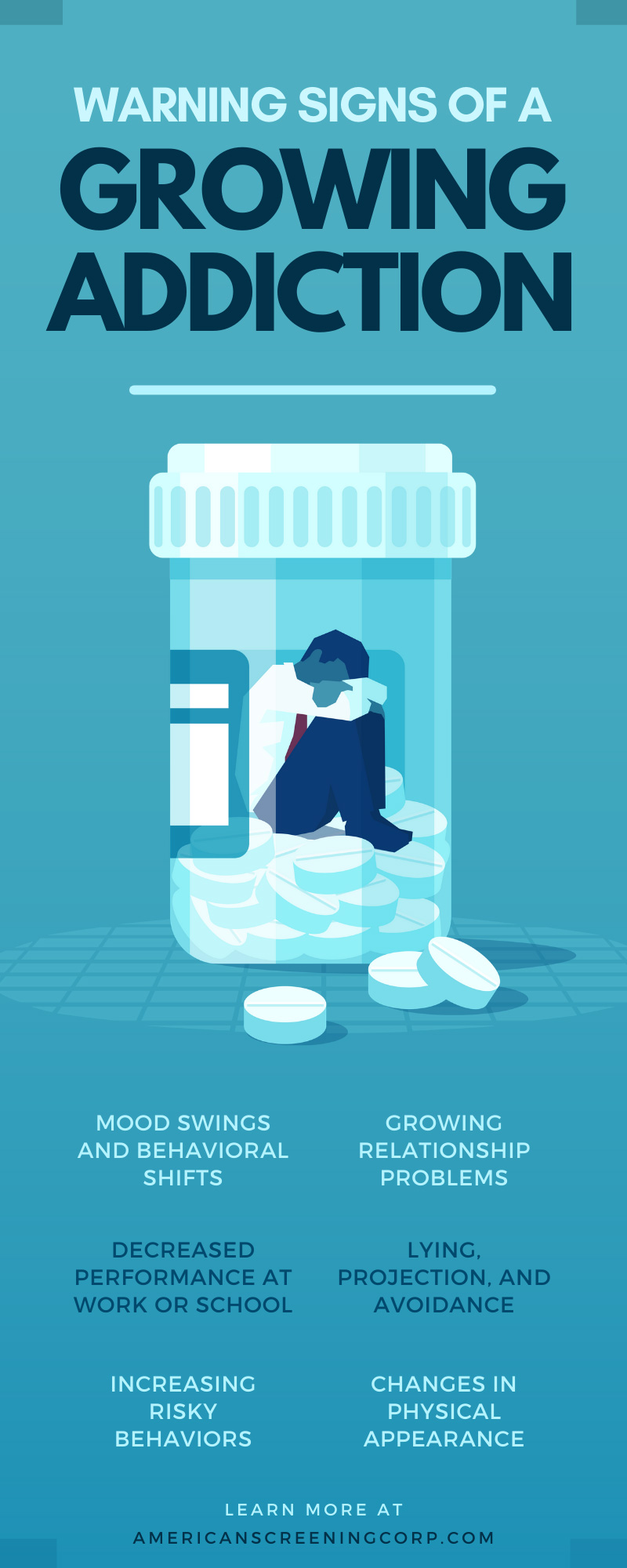8 Warning Signs of a Growing Addiction

Addiction is a disorder that impacts all aspects of your life. When alcohol and drug use start to take over someone’s life, there are a few common symptoms and red flags that emerge. Catching addiction early makes it easier to begin the journey of recovery. When you’re aware of the warning signs of a growing addiction, you can find help for yourself or offer help to a loved one before the situation gets worse. If you suspect casual or prescribed substance use has turned into a problem, keep an eye out for these common signs, symptoms, and red flags that come with addiction.
Mood Swings and Behavioral Shifts
Personality shifts are one of the easiest signs to notice. Addiction can come with a wide range of mood disorders—such as anxiety or depression—that create behavioral changes. Many addictive substances also cause mood swings. Someone suffering from addiction might feel energetic and excited one day, then lethargic and listless the next. Unpredictable behaviors and mood changes become more pronounced the longer the substance abuse goes on. In extreme cases, addicted individuals no longer resemble the person they were before. While these behavioral changes get worse with growing addiction, they’re also a major symptom of withdrawal. Individuals who try to cut back on a substance might also suffer from sharp mood swings, especially during the first few days of withdrawal.
Growing Relationship Problems
Relationship problems are among the most common and stressful warning signs of a growing addiction. Addiction causes someone to prioritize the substance they’re abusing—even over their own friends and family. Someone suffering from addiction might start ignoring responsibilities like running errands or taking care of kids. They might isolate themselves by canceling plans or ignoring their loved ones. For some individuals, addiction causes increased aggression, which turns into frequent fights—especially with other members of their household. These and other issues put a strain on relationships and create problems that only get worse as someone becomes more and more addicted to alcohol or drugs.
Decreased Performance at Work or School
Personal relationships aren’t the only parts of life that suffer at the hands of addiction. Someone might also experience professional consequences as their school or work performance starts to decline. Addiction causes people to make poor decisions. Someone who always brings their best self to work might start showing up late and hungover. In extreme cases, they might even show up to work intoxicated, believing that no one will notice or that they need their addictive substance to get through the day. Meanwhile, the behavioral symptoms of addiction can put a strain on professional relationships. Increased aggression or irritability can make someone a pain to work with, ruining coworker bonds and even creating major professional consequences, including probation or termination.
Lying, Projection, and Avoidance
No one wants to admit they have a problem, especially in the early stages of addiction. That’s why many addicted individuals look for ways to shift or avoid blame. This might mean keeping secrets and hiding their substance abuse. An addicted individual might also brush off the problem or project their blame onto others when someone confronts them. For example, someone might blame their decreasing work performance on their colleagues or boss instead of admitting that their substance use is causing the problem. If someone can avoid taking the blame, they don’t have to admit they have a problem or try to change their behavior.
Decreasing Interest in Other Parts of Life
Everyone has interests, hobbies, and favorite pastimes that they fill their life with. Addiction puts all of those activities and interests on the backburner. Someone suffering from addiction prioritizes the addictive substance over everything else. They might stop reading in their free time, give up on creative pursuits, or quit teams or clubs that they previously enjoyed. Losing interest in these passions is a significant red flag for both addiction and depression. No matter the cause, decreasing interest in fun pursuits such as these is a good indicator that something needs to change.
Changes in Physical Appearance
Addiction also comes with many physical changes and symptoms. Addiction causes one’s health to decline, no matter what the addictive substance or behavior is. Because addiction frequently affects appetite, extreme weight loss or gain is one of the most common changes in physical appearance. Other notable appearance changes are bloodshot or glazed eyes, increased bruising or scarring on the arms, poor hygiene, and declining skin, hair, and teeth health.
Other Physical Symptoms
Physical appearance and other physical symptoms go hand in hand. Someone suffering from addiction might experience flu-like symptoms like chills, sweats, aches, or nausea. These symptoms frequently stem from drug withdrawal. Withdrawal from alcohol can cause symptoms such as insomnia, irritability, tremors, and anxiety. In extreme cases, alcohol withdrawal can even cause seizures. In addition to these withdrawal symptoms, addiction also increases someone’s tolerance for a substance. This is especially noticeable in alcohol addiction. If someone starts drinking in larger amounts without feeling the effects, it often means they’ve been abusing the substance.
Increasing Risky Behaviors
Poor decision-making, impulsive thoughts, and a lack of self-control are all symptoms of addiction. These behaviors are also a volatile combination that can easily lead to risky situations. From lapses of judgment to increased aggression, someone suffering from addiction can find themselves in progressively dangerous situations. Fights in bars or other public areas are a common example. Someone might also find themselves partaking in more and more perilous behaviors in order to obtain their addictive substance—like underhanded drug deals in dangerous locations. Substance abuse also impairs one’s judgment, meaning normally obvious decisions—such as finding an alternative way home when you’re intoxicated—are no longer clear. That’s why drunk or drugged driving are common risky behaviors associated with addiction.
Just as other symptoms of addiction bring personal or professional consequences, risky behaviors like these frequently come with legal ramifications. Many jurisdictions have laws against public intoxication, meaning you can end up paying fines or even spending a night in jail if you’re visibly intoxicated in public. Fights can lead to assault charges, while purchasing drugs illegally is a good way to face possession charges. Lapses in judgment—like driving while intoxicated—can also lead to legal and financial consequences, including an SR22 requirement, a license suspension, and court-mandated rehab.
No matter what stage of addiction you’re in, facing the consequences of your actions is a difficult but necessary step on the road to recovery. The process becomes easier when you have the right people at your side. When it comes to navigating the consequences of a DUI, Serenity Group is here to help. We’ll help you learn the ins and outs of your SR22 requirement so that you can find the cheapest SR-22 insurance in California or any other state you’re in. Seeking help from both professional and personal sources helps you establish a support network that can help keep you on track throughout your recovery journey.


Recent Comments